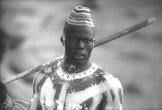






| Nuba
Conversations
The fundamentalist Sudanese regime is pursuing its policy of forced Arabization through a systematic disruption of the Nuba family, the key agency of cultural transmission. Howes hears from Nuba refugees in Khartoum how soldiers of the Islamic National Front killed their cattle for food, seized their land for profitable mechanized agriculture and burnt their villages. 60,000 Nuba children have been abducted to "Peace Camps" where they are forcibly converted to Islam and, some as young as 12, make unquestioning recruits for the Sudanese army. Howes estimates that 40% of the Sudanese army is now composed of Nuba men. He interviews one despondent soldier who admits that he is probably fighting on the wrong side against his brothers but there is no other work for displaced Nuba. Although originally neutral in the war between North and South, Islam and Christianity, many other Nuba have been driven into the rebel ranks of the SPLA (Sudanese People's Liberation Army.) Howes makes his way to the mountains where he finds the Nuba women scattered living in caves and foraging for food among landmines and marauding Sudanese soldiers. He then visits a refugee camp in Kenya where an elder deplores the disruption in Nuba culture which, he feels, is producing an idle, dissolute generation of young people. At the camp, Howes is finaly able to show Kafi's Story to a Nuba audience captivated to see their former way of life preserved on video. It is ironic that a film designed to show Nuba life to the rest of the world has, after just ten years, become a way of showing the Nuba to themselves. Advertising and Consumption Media Literacy Sociology of Culture |
"Howe's film
works as a both searing journalism and a passionate first person account
of the unaccountable, a document of what has to many Western eyes remained
an invisible cataclysm." "An eye-opening
account of a little-known humanitarian disaster…A powerful and compassionate
film which should succeed in drawing attention to the plight of a people
under real threat of cultural extinction. " Producer/Director:Arthur
Howes
Video Purchase: $195
|
 Ten
years after shooting
Ten
years after shooting